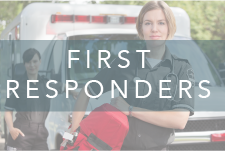First responders are seen as some of the strongest, most respected members of our communities. They are tasked with exuding strength and safety while maintaining control and composure in any kind of high-stress situation. However, they are not immune to trauma, and the nature of their work puts their mental health at risk just as much as their physical health. Providing trauma and mental health crisis training for first responders and building resilience for first responders and their families daily can set the groundwork for a healthier, balanced daily life.
Providing this information and breaking down stigmas that still surround mental health and trauma treatment can instill necessary preventative measures for first responders, as well as open each officer up to the importance of crisis response training mental health for themselves and others. Coping with the daily traumas that first responders may see is a difficult task. However, taking one’s mental health seriously and one day at a time can go a long way in helping cope with daily stress, trauma, or PTSD.
Overcoming Barriers
Working as a first responder inherently comes with many risks. While much training is put into being able to physically cope with an array of different life-threatening situations, these risks also take a large mental toll and are a huge source of first responder stress.
However, this topic is discussed much less often. There can be several barriers that may prevent someone from talking about their mental health. Whether it is to daily continue presenting the image of a strong figure, or if someone is feeling shameful in the idea that they need help, these barriers can make getting help difficult.
Overcoming these barriers means directly addressing many of the stigmas that still surround mental health and therapy. Yet with the nature of one’s life as a first responder, trauma can be ever-present, and normalizing the need for help is paramount for the health of all involved.
The existence of the stigma surrounding reaching out for mental health counseling is something that perpetuates itself. Overcoming the barriers that may be present for any one person to reach out begins with having an honest conversation. Whether they are talking to superiors about effective programs that help police officers deal with stress (such as CISM or specialized centers that cater to the unique problems of first responders) or involving their family to begin allowing themselves to experience their human side, overcoming barriers begins with a willingness for someone to speak to understanding peers who will listen.
Incorporating the Family
Talking about one’s struggles with traumatic experiences with supportive family or friends at home can help someone begin to normalize themselves with letting down their guard and discussing the persistent issues they may face every day. Families are often unconditionally understanding, and are in the unique position where they can see first responders both as heroes who exude strength and safety, as well as regular people who have their own needs. Talking about these issues on a familial front can both help others understand the kind of support that first responders may need, as well as help them set expectations for themselves through stressful times.
Prepare Early
It can be impossible to know when a traumatic event may strike, or even which traumatic events will stick with someone more than others. Learning how to be prepared for trauma involves setting up a plan early. Whether someone is doing research on support groups specifically for first responders or setting up a method of relaxation and self-care, having systems in place for when you may need them can take some of the stress out of any situation. Looking for options and outlets while someone is experiencing symptoms of PTSD, stress, or anxiety can be a difficult task, and can feel overwhelming when trying to tackle all of it at once. Having a plan alongside family and friends already in place can help you make clear decisions on how you can help yourself during times of crisis.
Practice Daily Routines
Dealing with unexpected stresses can be very difficult to cope with. However, it is also part of the job description for a first responder. As a result, it is important to find structure and consistency in one’s day wherever you can. Feeling like things are constantly in motion or otherwise out of your control can create a stressful atmosphere, and daily routines and practices are one of the best ways to address the hectic nature of your day. Keeping as many elements as possible consistent, such as mealtimes, bedtimes, setting scheduled time for yourself to decompress — even just by watching a television show — can all provide a key element of structure to one’s day. By keeping these things as consistent as possible, you can always feel like you have a safety net and a sense of familiarity to fall back on, even during times of stress or after traumatic events.
Practice Grounding Strategies Daily
Constantly grounding oneself in the real world is also an essential practice as you are preparing to deal with trauma. Even on a daily basis, whether you are at home or work, reaffirming one’s environment and its elements can prepare you to use the technique during high-stress scenarios. Naming elements of one’s environment out loud or to yourself, such as “chair,” “desk,” “mug,” can help condition you to be able to employ such grounding techniques amidst potentially traumatic events.
Practices for Confronting Guilt
Unfortunately, guilt is a prominent feeling for first responders. It is common to wonder if there was a better way to handle a situation or to feel like you failed on a personal level if a colleague or civilian was hurt during a dangerous event. The constant barrage of “what ifs” can take a massive toll on one’s mental health, and can introduce self-doubt into an already fragile situation. Hanging onto these feelings can cause any number of difficulties through your daily life, so confronting guilt and its reality is a crucial part of being prepared.
Making lists is a common way for someone to objectively view their situation. Making a list of things that you can and cannot control can be a way for someone to relieve themselves of some of the feelings of guilt that may have plagued their thoughts. It can provide a list of key things that they can control in any given situation, and provide a way for them to fairly portray themselves amidst traumatic experiences.
Keeping journals of one’s experiences is also highly recommended. Journals provide a private outlet for someone to express their struggles and emotions without worrying about societal stigmas while also acting as a record of all the ways in which someone has helped those around them. Traumatic situations can cloud someone’s memory of the good that they have done for a community, and being able to fairly judge oneself means having a way to remind themselves of all the good they have done regularly.
Keep Working as a Team
Being prepared for trauma doesn’t mean that anyone is immune to it. However, nobody ever has to go through it alone. Much of the training for first responders involves learning how to work as a team, support each other, and how to manage a situation as one unit. This practice doesn’t have to end once someone gets off their shift. Whether someone is dealing with a traumatic situation, physical trauma, or mental crisis, teamwork and communal support are necessary at all times. Being prepared to deal with traumatic events involves deconstructing the notion that getting mental support is somehow a sign of “weakness,” and instead, an issue that affects everyone. Learning to support each other shows that not only is someone allowed to let down their guard and be supported, but also that they are allowed to be human just as often as they are expected to be heroes.




